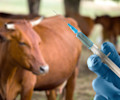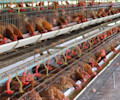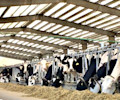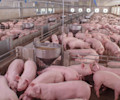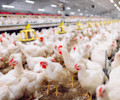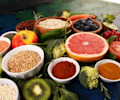Research from $19 trillion-backed FAIRR investor network raises concerns of poor management of climate emissions, deforestation and antibiotics
$30 billion group of meat and fish producers in Brazil, Chile, Mexico and Colombia assessed on sustainability including JBS, Marfrig and Grupo Nutresa. Mexican firms Grupo Bafar and Industrias Bachoco in bottom 20% of global producers.
Four of nine firms invested in new plant-based products last year, capitalising on growth in the ‘alternative proteins’ market in the region
Six firms categorised as ‘high risk’ for poor approach to greenhouse gas emissions and antibiotics.
Deforestation: Major Brazilian meat firms are not addressing deforestation risks linked to threatened Cerrado savannah, which supplies much of China and the EU with soy imports.
(Rio de Janeiro, 07 November 2019), The $19-trillion backed FAIRR investor network has today warned investors in the food sector in Latin America that some of the region’s largest meat, fish and dairy suppliers are not doing enough to mitigate material environmental and social risks. However, it also highlights a major growth opportunity for ‘alternative proteins’ in the region.
The Coller FAIRR Protein Producer Index assesses 60 of the largest publicly-listed meat and fish producers globally. Today, a regional edition focusing on nine firms headquartered in Brazil, Chile, Mexico and Colombia with a combined market cap of $30.77 billion was published.
The Index highlights a leap in investment in the ‘alternative proteins’ sector in the last year. The plant-based protein market is expected to grab as much as 10% of the global meat market within 15 years[1]. Four meat giants JBS (Brazil), BRF (Brazil) Marfrig (Brazil) and Grupo Nutresa (Colombia) have all announced investments or new product launches in the alternative protein space this year. Investors should seek to understand if company investments are in response solely to consumer trends or to build more resilient business models by diversifying their product portfolios.
However, the Index found that the region’s animal agriculture sector was performing poorly on other sustainability criteria including climate emissions, deforestation and antibiotics. Among the concerns highlighted for investors were:
Greenhouse Gas Emissions: Six companies (Salmones Camachanca, BRF, Empresas AquaChile, Minerva, Grupo Bafar and Industrias Bachoco) are categorised as “high risk”- i.e. they have little to no disclosure on greenhouse gas emissions targets across their operations and supply chains. Only one company, Marfrig, has a complete emissions inventory, meaning that they report on agricultural emissions resulting from animal feed.
Deforestation: Four companies (Minerva, Grupo Nutresa, Grupo Bafar and Industrias Bachoco) are categorised as “high risk” as they do not disclose any management of deforestation risks linked to soy supply chains. In Brazil, the three major Brazilian beef producers, JBS, Marfrig and Minerva, have a commitment to avoid deforestation in the Amazon, however their commitment and traceability appears limited to direct suppliers and none of the firms address deforestation risks linked to the threatened Cerrado savannah, which supplies much of China and the EU with soy imports.
Antibiotics: Three companies (Minerva, Grupo Bafar and Grupo Nutresa) are categorised as “high risk” as they do not have any policy on antibiotics nor disclose the quantities or types of antibiotics used on their farms. This despite the emergence of antimicrobial drug resistance hotspots in the south coast of Brazil and around Mexico City[2].
Fernando Manrique, Head of Equities, HMC Capital said:
_“_Demand for meat and fish continues to provide positive economic opportunity, and has made Brazil the largest cattle meat exporter in the world. But the environmental and public health risks associated with animal agriculture are significant. Investors have a clear message for the animal agriculture industry in Latin America, that it must do more to meet challenges such as climate change, deforestation and antibiotic resistance. As investors we are actively engaging with companies to help them enhance their food supply chain ESG practices to manage long term risks for all stakeholders”.
Notes to editor
For more information contact Juliana Garçon Tel: + 21 9 7337-4616 | Skype: Juliana.Garcon | email: julianagarcon@gmail.com
Methodology: All companies are given an overall ranking of ‘low’, ‘medium’, ‘high’ risk’ or ‘best practice’, based on their scores against nine sustainability factors. These are: Greenhouse gas emissions; Deforestation and biodiversity loss; Water scarcity and use; Waste and pollution; Antibiotics; Animal welfare; Working conditions, Food safety, and alternative proteins. A full methodology is available in the Index report or online. All valuations are based on market capitalization figures as of May 31st 2019.
A full report with all results and details of the Coller FAIRR Index is available on request or at fairr.org/index. The nine companies assessed by the Coller FAIRR Index in Latin America are:
Company
Country
Main protein category
BRF
Brazil
Poultry & Eggs
Empresas Aquachile
Chile
Aquaculture
Grupo Nutresa
Colombia
Multiple
Grupo Bafar
Mexico
Multiple
Industrias Bachoco
Mexico
Poultry & Eggs
JBS
Brazil
Multiple
Marfrig Global Foods SA
Brazil
Beef
Minerva
Brazil
Beef
Salmones Camachanca
Chile
Aquaculture
[1] See FAIRR’s Appetite for Disruption report, research by Barclays Capital
[2] Science ‘Global trends in antimicrobial resistance in animals in low- and middle- income countries’ 20th September 2019. Available online at: https://science.sciencemag.org/content/365/6459/eaaw1944
About FAIRR
The FAIRR Initiative is a collaborative investor network, established by the Jeremy Coller Foundation. Its mission is to build a global network of investors who are focused and engaged on the risks linked to intensive animal production within the broader food system. FAIRR helps investors to exercise their influence as responsible stewards of capital to engage and safeguard the long-term value of their investment portfolios. This is the second year of the Coller FAIRR Protein Producer Index which was shortlisted by the UN-supported Principles for Responsible Investment as ESG Research Report of the Year for 2018**.** www.fairr.org

